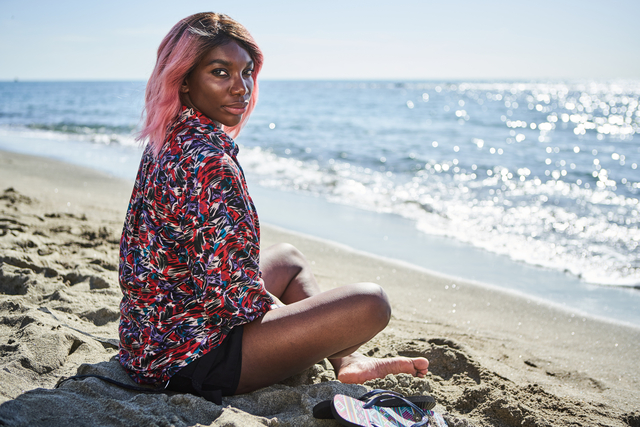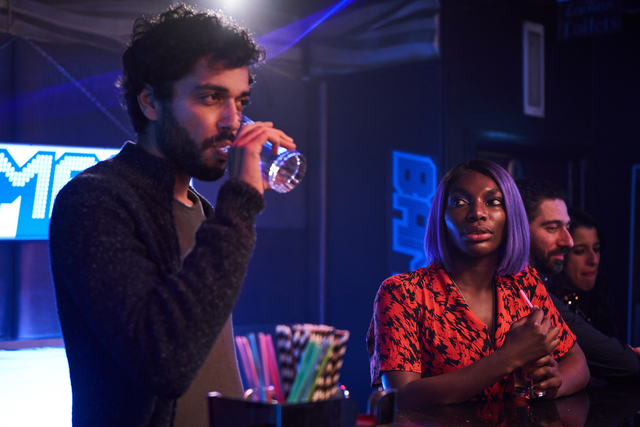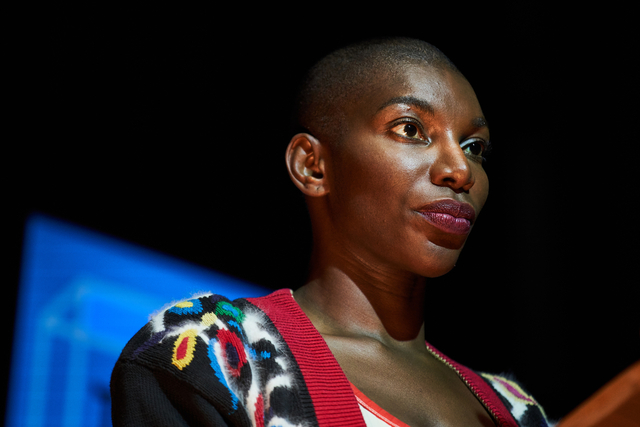You could have watched your drink: I May Destroy You and the allure of alternate realities
by Eve Ettinger

(Welcome to the Wednesday newsletter, this week on Thursday! Each week, I’m publishing a new pop culture essay from a freelancer. For the month of February, these are going out to all subscribers, but I’m putting them behind the paywall starting in March. If you subscribe, it helps me pay these freelancers for their efforts! This week: Eve Ettinger, one of my favorite writers out there, on just why they found HBO’s I May Destroy You so triggering.)
Over the summer, stuck in the feeling of being dislodged from time in between teaching terms, I watched I May Destroy You with the rapt attention of someone both enchanted by the deft storytelling and beautiful cinematography and triggered out of my mind by the depictions of sexual assault and the community’s response to these situations. Other survivors of sexual assault and I watched and discussed the show each week, curious to see how Michaela Coel would shape the narratives of Arabella, Kwame, and their friends. We were curious and a little emotionally frayed by the brutally intimate depictions of sexual violence. (Full disclosure, I wrote this essay before I had finished the series, and I will not spoil the ending here.)
In the late fall of 2016, I was stealthed. I reported it as a rape and lost my job and my home in the fallout. In the early months of 2017, I was roofied at a bar in NYC while out with some good friends. They put me in a cab and sent me home alone, unaware that I was anything other than drunk. In the fall of 2017 I started dating and fell for a man who abruptly dumped me six months later for no obvious reason. I found out months afterward that when he left me, I’d been dangerously close to discovering he’d raped his ex-wife. I grieved the loss of a relationship that had made me feel secure after my sexual assaults, only to find that the person I was grieving was a rapist.
My experiences mirror those of Arabella, and Coel herself, who based this series in her own experiences of assault. Arabella is roofied and sexually assaulted. She doesn’t remember it, and the police are useless in helping her. Afterward we both went through the careless use of alcohol and sex to distract from being emotionally hung up on someone unavailable in another country, blackouts in a bar bathroom with no sense of time lost or what might have occurred, and reporting processes that were unproductive and gave us no closure.

I gobbled up the first three episodes of the show in one evening, only to stay up all night afterward thinking over these stories of mine and replaying parallel scenes from the show in my head. Over the next day and a half, I was in a sort of fugue state, hypervigilant and irritable, my PTSD flaring up so that every auditory sensation was overwhelming and every minor logistical setback grated on my nerves until I reached a breaking point and snapped at my sister (who was living at me at the time) in a way I hadn’t snapped at anyone since I’d been in the throes of my divorce.
I couldn’t figure out why I was so triggered — was it just the experience of revisiting those memories and experiences through the lens of Coel’s creation and on-screen persona? Or was there something more? I kept watching to understand. Kwame’s assault and the aftermath (he’s raped by a hookup from an app, and his assault is brushed off by his friends) was devastatingly depicted. Arabella’s callousness and Terry’s rigid focus on “self-care” in response to his appeals for support made me both laugh and cringe.
The feeling of losing control when something devastating happens often drives people to extremes. Rule-focused methods of coping that are just grasping for control. Performing one’s pain on social media in real time to make it seem tangible and contained. Dismissing your experiences as not as consequential as those of others. These are the deeply human emotional dodges that we act out when our pain is too much to look at head on. When tasting our own hurt would destroy us, we turn outside ourselves to look elsewhere, to step into the viewpoint of anyone other than ourselves.
When I went through that series of sexual assaults and betrayals, I threw myself into work, into trying to process things that had nothing to do with what I’d experienced. I drank. I fucked. I made abrupt decisions about what was best for me from that point forward as if they were urgent, crisis-driven decisions. None of them were. There was no fire anywhere except the one in my own veins, the shaky fear that still kept me up at night and jolted me awake gasping, desperate for someone to hold onto and tell me I was safe every morning.
I also fantasized about alternate realities. Science fiction has always been the narrative womb of processing things too dark in reality to face directly. Dystopian fiction serves as a buffer from reality so that we can look at the horrors of a fascist state or environmental collapse without feeling too overwhelmed by our own potential futures. I put myself into the minds of my assaulters, creating narratives of misunderstanding, of kind intent. I daydreamed my own gaslighting, talking myself around and around the question of fault, of autonomy.
Both assaults had moments where I felt cocky, sure of myself and my power. Both left me feeling alone and unable to identify the moment at which I had gone from being a sexy young thing having some fun to a rape victim and roofied person stumbling up the front steps of a Brooklyn rowhouse. There was never any one moment. I was both/and the whole time. No matter how I tried to parse it out, the grammar of those coexisting selves was too interlocked to diagram into separate clauses.
Last July, I heard a clip from Coel’s interview on The Economist Asks podcast, where she talks about her vision of the power and responsibility available to those who have experienced sexual assaults like hers and mine and Arabella’s. The quotation in full is as follows:
“If somebody says, ‘You should have watched your drink.’ But if you whisper to yourself at some point during your healing ‘if I had watched my drink, this wouldn’t have happened,’ perhaps it doesn’t sound so scary. It’s just a fact. The fact is, if you were watching your drink, you would have seen somebody put some things in it. However, do any of us watch our drinks constantly? Do we make sure we see the barman at all times when he pours the drink? We don’t. When you start looking at that fact you see a very grey area where it involves this word that’s perhaps become very taboo around this subject. And I understand why it’s taboo, and it’s going to get everybody’s backs up when the word comes out. It’s a scary word: responsibility. And it doesn’t mean that Arabella is responsible for what happened to her. But she can find, within that scene of when her drink was spiked, she can find herself not being powerless. When you dare to face that, for me personally, I gained some sort of power. I don’t know why, but when I allowed myself to just look and go, ‘And there was the minute when perhaps I was looking somewhere else...for a second it could have been, and that’s when it happened.’ It doesn’t place any blame on me. But to shield me, to shield Arabella, to shield anyone from that moment is to keep somebody as an infant. You’re making them only see it from a two dimensional view where there is a victim and a criminal and the criminal did everything, and you did nothing. Everything happened to you. But that is such a powerless way of seeing life. And I don’t know how much we can grow and how much we can find our power if we are only seeing things that way.”
Listening to Coel say these things knocked the wind out of me. Her rationalization process around her experiences drove her portrayal of assault in the show, and drove what made it so triggering to me. Arabella’s turning on Kwame for sleeping with a woman without disclosing that he is gay is a prismatic reflection of this thought process. It offers just enough distance to remind the viewer that Arabella isn’t being reasonable to Kwame, but not enough distance to allow Kwame the reassurance that he had the right to explore sexually as he needed in order to heal without being shamed for it. Arabella isn’t Coel, but she is a character experiencing and processing things similar to what Coel herself went through. Arabella’s harshness toward herself and others may not reflect Coel’s personal attitudes, but this comment from Coel illuminates an attitude that bleeds through to the show.

Coel believes that suggesting there might have been an alternate timeline in which watching the drink could have prevented the subsequent assault isn’t an example of victim blaming. And she’s right. She’s not directly implying that the assault is the fault of the victim, but she is implying that the agency of the person assaulted extends to behaving in such a way that the rapist would attack someone else instead, that the timeline could be nudged so the roofie would end up in someone else’s drink that night instead of hers. This, too, is a kind of science fiction alt world writeup where you can pop back into the critical moment and disarm the bomb from going off. Such magical thinking is a natural part of processing, but it assumes a few things that I worry are dangerous to those trying to heal from the trauma of sexual assault.
First, Coel’s argument assumes there is no world in which someone is not assaulted that night. It imagines the rapist in the position of some ever-present force that will act in a consistent direction no matter what is thrown in its way. In some respects, this is fair. A predator is going to do what they want to do, and the victim cannot dress or walk or act in ways that will prevent someone determined to violate from carrying out their foul vision. But this is a limited vision of society, in which we hand over to violent predators perpetual power by giving up on eliminating the origins of their violence in the first place. A restorative vision of responsibility must work backwards and ask why someone would do such a thing and what they are crookedly seeking out, must ask how to provide these people the kinds of connection and community that would curtail behaviors of such alienation and cravenness.
Secondly, it assumes that all one is responsible for is oneself when one is out at a bar — the individualism that sent Terry home the night Arabella got roofied is the same individualistic mindset that allows Coel to argue that the story could have been different if she had just looked out for her drink at the right moment. It’s not my fault, this thinking goes, but I could have prevented it. Some forms of individual autonomy can always be exercised by people more than they do, but that’s not the solution here. We cannot save ourselves from suffering by constantly being better individually. Saving ourselves from suffering is the work of a community. What responsibility does Terry have to Arabella? What responsibility does Arabella have to Kwame? What responsibility does the bartender have to their patrons? What responsibility does the person at the next table over have to their neighbors?
The bystander effect myth centers around the assumption that if someone had just called the police, Kitty Genovese would have survived her rape and not been murdered. But the reality of that story is that a community came together to help her in the moment but could not access the proper resources to save her life because they were queer and vulnerable to police violence if they had tried to get the authorities to help. If the police had been involved in my case and tried to catch the predator, would I still have felt isolated and unmoored, “safe” but unsupported and confused?
I could have watched my drink, but should I have needed to? The idea that this question is infantilizing according to Coel fascinates me. Why does the assumption that I was not responsible for what happened to me leave me shielded from growth? Am I supposed to have grown because of what I experienced? At this point, I wonder about Coel’s past in evangelical Christianity (we both spent significant time as true believers in a conservative church environment) where the teaching that suffering is for personal refining and spiritual growth is common. “God must have a reason” / “God intended it for my good” is thrown about in these communities so much that the question of suffering becomes utterly severed from cycles of life and death within eons of time, and becomes one of individual significance in the universe and in time. My story matters so much that God must have chosen this thing to happen to me so that I could grow. If this is the subtext of Coel’s statements about growth, then I can codify better Arabella’s anti-hero narrative arc and the impact her behavior has on her friends: she’s being prepared for a humbling, for a moment where she’s grateful for her assault because now she understands herself and the world better. But my assaults didn’t make me understand myself better, they didn’t cause me to grow, and I am deeply uninterested in gratitude for them.

My behavior has changed after these assaults. I watch my drink, I drink less when I’m out in public. I keep a buddy close by me and go home with someone, planned well in advance. I say, “No,” long before I get vulnerable in ways that might allow someone to push my boundaries. But this is all prophylactic. The risk is no less, and I am enjoying myself less and less freely while still knowing that nothing could really prevent anyone intent on harming me from succeeding in doing so. Do I feel empowered by these changes in behavior? Do I feel more responsible for myself? I do not. I feel rusted into these habits by fear, I feel tired, I feel inhibited. Where is the power in that?
Speaking to other survivors who are watching I May Destroy You with similar triggered responses, I hear this over and over again. Choosing to take on the chance that we could have prevented our assaults is like eating spoiled food on purpose. We feel sick at the thought, and we feel sick at the reality that even if we don’t believe we are responsible for what happened, we are still changing our behavior in ways that may or may not prevent another assault, as if we are in fact responsible for our own assaults.
Acting in ways that control environments and actions always feels like it’s more secure, but life will never humor that fantasy. Systemic issues of cruelty and abuse are always so much bigger than the individual actions of those affected by them. I can take dozens of precautions to live in a way that conforms to my ethics and values — I can cut out my consumption of factory farming, fast fashion, I can stop buying things through Amazon, I can show up to protests — and these things can make me feel better about myself emotionally. I didn’t do this, I can tell myself, when systemic issues are still untouched after I opt out. I did everything I could, everything in my power. But this is still a fantasy of control, a fiction that I have created to allow myself a sense of order to my own experiences and a heavier weight of individual significance in the long story of the universe than is actually true.
I could have watched my drink, but that just means someone else will get roofied instead of me. The problem is never going to be solved by my innocence.
Episodes is published three times per week. Mondays feature my thoughts on assorted topics. Wednesdays offer pop culture thoughts from freelance writers. Fridays are TV recaps written by myself. The Wednesday and Friday editions are only available to subscribers. Suggest topics for future installments via email or on Twitter. Read more of my work at Vox.




